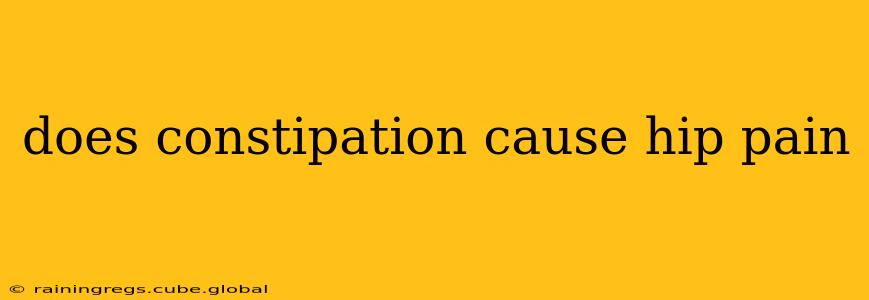Constipation, the infrequent or difficult passage of stools, is a common ailment affecting many. While often considered a purely digestive issue, some individuals report experiencing hip pain alongside their constipation. This raises the question: does constipation actually cause hip pain, or is there another explanation for this seemingly unrelated pairing of symptoms? The answer, as with many health questions, is nuanced.
While constipation itself doesn't directly cause hip pain in the way a fracture or dislocation might, there are several indirect mechanisms through which it can contribute to discomfort in the hip area. Let's delve into these potential connections.
How Constipation Might Lead to Hip Pain
Several factors can link constipation and hip pain:
1. Straining During Bowel Movements
Perhaps the most common connection is the act of straining during bowel movements. When you strain, you're engaging various muscle groups, including those in your abdomen, back, and even your hips. Repeated, forceful straining over time can lead to muscle spasms, inflammation, and even minor injuries in these areas, resulting in hip pain or discomfort. This is especially true if you have pre-existing muscle imbalances or weakness.
2. Pelvic Floor Muscle Tension
Constipation often involves tension in the pelvic floor muscles. These muscles support the pelvic organs, including the intestines and bladder. Chronic constipation can lead to chronic tension in these muscles, which can radiate pain to the hips, lower back, and even down the legs. This is because the pelvic floor muscles are interconnected with the hip muscles and fascia.
3. Increased Abdominal Pressure
Severe constipation can significantly increase abdominal pressure. This increased pressure can put stress on the surrounding structures, including the sacroiliac joints (SI joints) located where the spine connects to the pelvis. SI joint dysfunction is a known cause of lower back and hip pain.
4. Referenced Pain
It's important to consider the concept of "referred pain." This occurs when pain originating from one area of the body is felt in another. In the case of constipation, the discomfort from distended bowels might be referred to the hip area due to the complex network of nerves in the abdomen and pelvis.
5. Underlying Conditions
In some cases, constipation and hip pain could be symptoms of an underlying medical condition, such as inflammatory bowel disease (IBD), endometriosis, or other pelvic issues. These conditions may directly or indirectly cause both symptoms.
Frequently Asked Questions (FAQs)
Here are some frequently asked questions addressing the connection between constipation and hip pain:
How long does hip pain from constipation last?
The duration of hip pain associated with constipation depends on several factors, including the severity of the constipation, the individual's overall health, and the presence of any underlying conditions. If the pain is solely due to straining or muscle tension, it should resolve once the constipation is relieved. However, if there's an underlying condition, the pain might persist longer.
What should I do if I have hip pain and constipation?
If you are experiencing both hip pain and constipation, it's crucial to consult a healthcare professional. They can help determine the cause of your symptoms, rule out any serious underlying conditions, and recommend appropriate treatment options. This may involve addressing the constipation directly through lifestyle changes, medication, or other interventions.
Can constipation cause chronic hip pain?
While acute constipation-related hip pain usually resolves after a bowel movement, chronic constipation can contribute to persistent hip pain due to repetitive straining, chronic muscle tension, and potential SI joint dysfunction.
Is it possible for hip pain to cause constipation?
It's less likely that hip pain directly causes constipation, although chronic pain and immobility can sometimes lead to changes in bowel habits due to decreased physical activity and potential medication side effects.
Disclaimer: This information is for general knowledge and does not constitute medical advice. Always consult a healthcare professional for any health concerns or before making any decisions related to your health or treatment.
